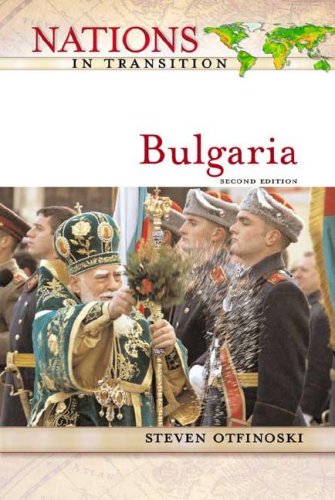Items related to Bulgaria (Nations in Transition)

Synopsis
A look at Bulgaria since the fall of communism.
"synopsis" may belong to another edition of this title.
From Kirkus Reviews
This latest entry in the Nations in Transition series recounts the history and struggles of Bulgaria and the hardships connected with its Soviet relationship. Otfinoski (Boris Yeltsin and the Rebirth of Russia, 1995, etc.) reveals the vast proble ms experienced by Bulgaria, so far unable to make the transition to a democratic system of government and a free-market economy; instead, the country has experienced ``economic disaster and near political chaos.'' Approximately the size of the state of Te nnessee, Bulgaria has been in crisis recently, but the coverage reaches back, presenting the government, religion, economy, culture, beautiful architecture, and great leaders, and offers a sense of a rich national identity. The author also makes excellent use of unfamiliar aspects of Bulgarian life to draw readers in: the roses grown there that produce an oil (attar) that is highly prized by perfume makers; the fact that this nation of ``yogurt-eaters has the greatest population of people over the age of 100 in all Europe''; and that the best surgeons earn about $60 a month. The road to democracy and prosperity is difficult for Bulgaria and readers will clearly understand that it has not given up its struggles. (b&w photos, maps, index, not seen, notes, c hronology, further reading) (Nonfiction. 12-15) -- Copyright ©1998, Kirkus Associates, LP. All rights reserved.
From School Library Journal
Grade 7 UpBoth of these books have introductory chapters on history followed by individual sections on government, religion, economy, culture, cities, and daily life. Present problems and potential future solutions are discussed in the concluding chapters. Otfinoski spends less time describing the transition period than Michael Kort does in Russia (Facts On File, 1998), a book in the same series; instead he includes a chapter on cities that reads like an upbeat travel guide. This may confuse readers because its optimism seems to clash with information elsewhere about economic difficulties. There are also a few serious internal contradictions and errors. In Ukraine, for example, readers are first told that after the breakup of the Soviet Union, The loss of Russia as a trading partner was a deep blow to the Ukrainian economy, whereas later it is correctly stated that Russia is still Ukraines number one trade partner. Its a shame because the book does have sparks of good writing. Each volume has somewhat lackluster black-and-white illustrations and photos, a useful chronology from prehistoric times through August 1998, and a short list of suggested readings.Elizabeth Talbot, University of Illinois, Champaign
Copyright 1999 Reed Business Information, Inc.
"About this title" may belong to another edition of this title.
- PublisherFacts on File
- Publication date2004
- ISBN 10 081605116X
- ISBN 13 9780816051168
- BindingHardcover
- LanguageEnglish
- Edition number2
- Number of pages126
- Rating
Shipping:
FREE
Within U.S.A.
Search results for Bulgaria (Nations in Transition)
Bulgaria
Seller: Better World Books, Mishawaka, IN, U.S.A.
Condition: Good. 2nd Edition. Former library book; may include library markings. Used book that is in clean, average condition without any missing pages. Seller Inventory # 2049300-75
Quantity: 1 available
Bulgaria
Seller: Books Puddle, New York, NY, U.S.A.
Condition: New. pp. 144 2nd Edition. Seller Inventory # 26548058
Quantity: 1 available
Bulgaria
Seller: Majestic Books, Hounslow, United Kingdom
Condition: New. pp. 144. Seller Inventory # 8381189
Quantity: 1 available
Bulgaria
Seller: Biblios, Frankfurt am main, HESSE, Germany
Condition: New. pp. 144. Seller Inventory # 18548048
Quantity: 1 available

